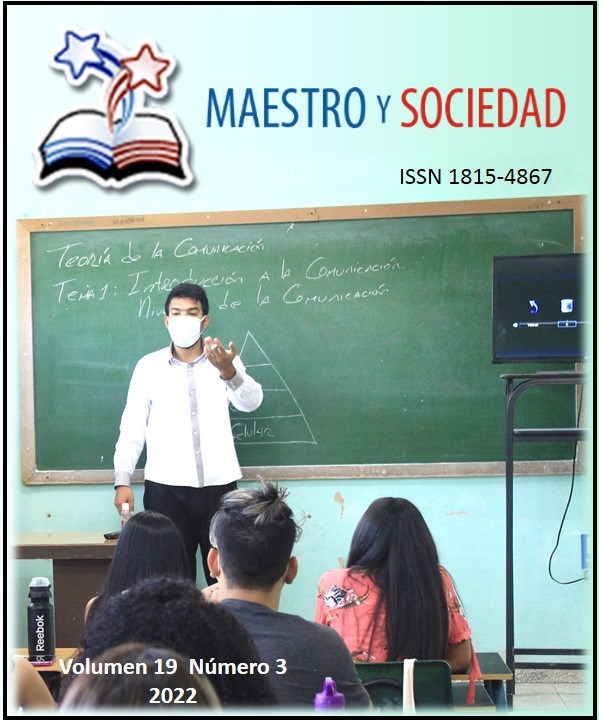Estrategia de superación profesional del maestro logopeda para la atención a educandos con discapacidad auditiva
Strategy for professional improvement of the speech therapist teacher for the care of students with hearing disabilities
Palavras-chave:
superación profesional, maestro logopeda, discapacidad auditiva, atención logopédica, professional improvement, speech therapist teacher, hearing disability, speech therapy careResumo
La Educación cubana da prioridad a la formación continua de los docentes para mantenerlos actualizados en el quehacer científico e investigativo. Con esta mirada, se estructuró una estrategia pedagógica de superación profesional de los maestros logopedas en la provincia Santiago de Cuba, dirigida a perfeccionar la preparación de los citados especialistas para la atención logopédica a educandos con discapacidad auditiva. Se sustenta en el método dialéctico materialista, se emplearon métodos del nivel empírico: análisis documental; entrevista, criterio de especialistas y del nivel teórico: histórico-lógico, análisis y síntesis, sistémico estructural funcional; estadísticos: estadística descriptiva y cálculo porcentual. Se concluye que dicha estrategia constituye un recurso que garantizó el mejoramiento en el desempeño de estos profesionales al proveerlos de conocimientos teóricos y procedimientos metodológicos especializados. Se caracteriza por el carácter multifactorial, interdisciplinar, diferenciado y contextualizado de sus acciones.
Cuban Education gives priority to the continuous training of teachers to keep them updated in scientific and investigative work. With this perspective, a pedagogical strategy for the professional improvement of speech therapist teachers in the province of Santiago de Cuba was structured, aimed at perfecting the preparation of the aforementioned specialists for speech therapy to students with hearing disabilities. It is based on the materialist dialectical method, empirical level methods were used: documentary analysis; interview, specialist criteria and the theoretical level: historical-logical, analysis and synthesis, functional structural systemic; statistics: descriptive statistics and percentage calculation. It is concluded that said strategy constitutes a resource that guaranteed the improvement in the performance of these professionals by providing them with theoretical knowledge and specialized methodological procedures. It is characterized by the multifactorial, interdisciplinary, differentiated and contextualized nature of its actions.
Referências
Aveiga, V., Rodríguez, L., y Segovia, S. (2018). Superación profesional y formación académica: ¿conceptos iguales o diferentes? Didasc@lia: Didáctica y educación, 9(3), 205-216 http://revistas.ult.edu.cu/index.php/didascalia/article/view/783
Bernaza, G. (2018). La superación del profesional: mover ideas y avanzar más. Ed. Universitaria del Ministerio de Educación Superior.
Delors, J. (1996). La educación encierra un tesoro. Informe de la Unesco de la Comisión Internacional sobre la Educación para el siglo XXI. Ediciones Unesco.
Fernández, G. (2017). Metodología para la atención logopédica integral en las instituciones educacionales cubanas. Revista Científico Pedagógica “Horizonte Pedagógico”, 6(1), 86-95. http://www.horizontepedagogico.rimed.cu/index.php/hop/issue/view/1
Fuentes, H., Montoya, J. y Fuentes, L. (2012). La formación en la Educación Superior. Desde lo holístico, complejo y dialéctico de la construcción del conocimiento científico. MÚTILE EDICIONES.
Ministerio de Educación Superior. (2019). Modelo de formación continua de la educación superior cubana. Resolución No. 138/19. GOC-2019-774-O65.
Ministerio de Educación Superior. (2019). Reglamento de la educación de posgrado de la república de Cuba. Resolución No. 140 /19GOC-2019-776-O65
Montero, A. (2021). La superación profesional del logopeda para desarrollar la comunicación oral en escolares primarios. [Tesis de doctorado. Universidad de Granma].
Montero, A., García, L. Massagué, L. (2021). La superación profesional del logopeda para al desarrollo de la comunicación oral a educandos del nivel educativo primaria. Revista Olimpia, 18(2). https://revistas.udg.co.cu/index.php/olimpia/article/view/2681
Sánchez, X., Puente de Armas, T., Sotolongo, R., Díaz, L. M. (2017). Estrategia de superación para el maestro ambulante sobre la psicomotricidad en niños con parálisis cerebral. Rev. Ciencias Médicas de Pinar del Río. 21(1), 101-111. https://www.medigraphic.com/pdfs/pinar/rcm-2017/rcm171o.pdf
Sarduy, Y. & Jimenez, A. (2015). La superación profesional del logopeda en implante coclear y su impacto en el desempeño profesional. Gac Méd Espirit, 17(1), 134-139. http://scielo.sld.cu/scielo.php?script=sci_abstract&pid=S1608-89212015000100015
Valle, A. (2012). La Investigación Pedagógica. Otra Mirada. Pueblo y Educación.
Publicado
Como Citar
Edição
Seção
Licença
Copyright (c) 2022 Adnery Lozada-Ortiz, Félix Huepp-Ramos, Ariolki Fumero-Pérez

Este trabalho está licenciado sob uma licença Creative Commons Attribution-NonCommercial-NoDerivatives 4.0 International License.
Esta revista proporciona un acceso abierto inmediato a su contenido, basado en el principio de que ofrecer al público un acceso libre a las investigaciones ayuda a un mayor intercambio global de conocimiento. Cada autor es responsable del contenido de cada uno de sus artículos. Los artículos pueden ser inéditos o estar disponibles previamente en servidores de preprints reconocidos por la revista. Sin embargo, no se permite la duplicación de la publicación o traducción de un artículo ya publicado en otra revista o como capítulo de un libro.
This journal provides immediate open access to its content, based on the principle that providing the public with free access to research supports a greater global exchange of knowledge. Each author is responsible for the content of each of their articles. Articles may be previously unpublished or available on preprint servers recognized by the journal. However, duplication of publication or translation of an article already published in another journal or as a book chapter is not permitted.
Esta revista oferece acesso aberto imediato ao seu conteúdo, com base no princípio de que oferecer ao público acesso gratuito à pesquisa contribui para um maior intercâmbio global de conhecimento. Cada autor é responsável pelo conteúdo de cada um de seus artigos. Os artigos poderão ser inéditos ou estar previamente disponíveis em servidores de preprints reconhecidos pela revista. No entanto, não é permitida a duplicação de publicação ou tradução de artigo já publicado em outro periódico ou como capítulo de livro.



























 Universidad de Oriente
Universidad de Oriente 